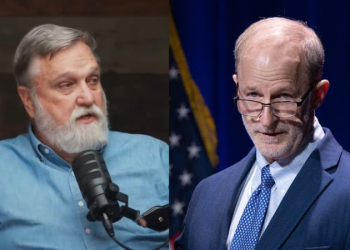A long-term, postmillennial vision provides essential perspective. Our generation isn’t unique—many have come before, and many will follow as Christ’s kingdom advances. Yet we often fall into two distinct errors: nostalgia, longing for idealized “good old days” of the past, and hubris, exaggerating our era as exceptionally pivotal in God’s plan. Both distort our calling, but they aren’t new.
As I’ve been preparing for a debate at the upcoming Future of Christendom conference, I’ve been diving into Alister McGrath’s Mere Apologetics. McGrath notes each generation’s tendency to romanticize the past, longing for ‘better’ times while ignoring their flaws. This got me reflecting on how this pattern plays out in history and even in our current cultural moment.
Let’s start with Augustine in the 5th century. Writing amid the collapse of the Roman Empire, Augustine addressed Christians who lamented the “good old days” of peace and prosperity. In one sermon, he challenged this mindset directly: “Yet you find men complaining about the times they live in, saying that the times of our parents were good. What if they could be taken back to the times of their parents, and should then complain? The past times that you think were good, are good because they are not yours here and now.”
Fast forward about 700 years to Bernard of Clairvaux in the 12th century. Bernard, a pivotal figure in monastic reform and the Cistercian order, critiqued the moral decay of his time. Moreover, in his writings, he noted that many in his day longed for the “purer” era of Augustine’s theological depth and spiritual rigor. Bernard sought to reform monasteries, aiming to restore the simplicity of early Benedictine life while condemning the church’s luxury and corruption.
Bernard’s era, marked by the Second Crusade and internal church conflicts, was later romanticized as a high point of medieval piety and unity, despite its challenges. By the 16th century, many longed for Bernard’s era or the broader medieval Christendom as a supposed golden age. Reformers sought to restore the purity of the early church, but some traditionalists within Catholicism idealized the medieval period—think monastic fervor under figures like Bernard or the scholastic synthesis of Thomas Aquinas. The Reformation itself was a reaction to perceived decline, with Protestants decrying papal corruption and yearning for Apostolic simplicity, while others mourned the loss of medieval “wholeness.” This era was rife with wars, plagues, and religious strife, yet it’s often mythologized today.
This pattern persists. Today, especially among some Christian nationalists, we see the same nostalgia—either for 1950s America, with its post-war prosperity and cultural Christianity, or for medieval Christendom, where Crusades were “cool” and the church appeared unified under Christendom’s banner. We pine for an era when faith shaped society more visibly, forgetting the idolatry and corruption of the past, or the governmental injustice lurking beneath 1950s Americana. This is always happening; humans are prone to gaze backward, idealizing what we never fully experienced.
But we’re also prone to the opposite extreme: thinking our generation is so important compared to the past. We hype our era as the tipping point—the final battle against secularism, where if we don’t act now (by whatever means it takes to “win”), all is lost. Both nostalgia and hubris are overreactions. A postmillennial vision should foster optimism about Christ’s ultimate victory but humility about our role. We’re not that special; God’s kingdom advances through ordinary faithfulness across millennia.
Here’s the practical rub: This distorted perspective fuels compromise. Every generation deems itself critical, believing any measure to “stem the tide” of paganism is vital—then we forsake God’s Law-Word for humanistic policies, like man-made legislation or pragmatic politics, instead of faithfully applying God’s perfect Law (theonomy) to all of life.
Take immigration as an example. Scripture warns that if a nation disobeys God’s Law, He will bring judgment through foreigners and sojourners (Deuteronomy 28:43-44; Leviticus 26:17). Yet today, rather than repenting and enforcing biblical justice—punishing evil like murder (abortion), theft (forced taxation and welfarism), and perversion (homosexual “marriage”)—our nation tries to dodge God’s chastisement by building walls and restricting immigrants. As I have said elsewhere, the problem isn’t people crossing borders; it’s our abandonment of one law for native and sojourner alike (Leviticus 24:22). If we submitted to Christ’s Lordship, eliminated the welfare state, and punished evildoers biblically, our land would attract the righteous and repel the wicked. Hard-working immigrants would add wealth, not drain it, and we’d shine as a city on a hill. But by focusing on bureaucratic barriers instead of obedience, we invite the very judgment we fear.
We see this in “conservatism” too. Modern conservatives react against leftist depravity but cling to pagan or Enlightenment ideals—Plato, Locke, or the Founding Fathers—rather than anchoring in Christ’s kingship. Like King Jehu, who destroyed Baal worship but kept Jeroboam’s golden calves (2 Kings 10:29-31), they fight evil partially but compromise on God’s Law, ensuring ongoing decline.
Brothers and sisters, let’s reject both nostalgia and unbalanced self-importance. Embrace the postmillennial hope: Christ’s kingdom will fill the earth (Isaiah 11:9). This will happen over many generations (including our own) applying God’s Law-Word. Our current task? Faithful application of theonomy in our time, leaving a godly example for generations to come. Christ will have the victory, but it will not come by our generation abandoning theonomy in order to “win” in our day. Any perceived “setback” from refusing compromise pales beside the blessings of the sovereign Lord of history.






















